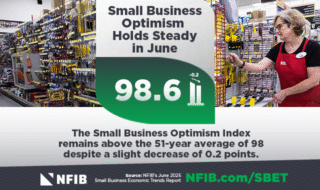May 17, 2022
Small Firms Expecting Better Business Conditions In the Next Six Months Hits Record Low
NFIB’s April Small Business Economic Trends (SBET) report found that for the second month in a row, the number of owners expecting business conditions to improve in the near future has fallen to the lowest level recorded in the 48-year history of the survey. A net negative 50% of owners said they expected better business conditions over the next six months, a one point drop from March’s record reading.
“Small business owners are struggling to deal with inflation pressures,” said NFIB Chief Economist Bill Dunkelberg. “The labor supply is not responding strongly to small businesses’ high wage offers and the impact of inflation has significantly disrupted business operations.”
The NFIB Small Business Optimism Index remained unchanged from March, still at 93.2. This is the lowest reading since April 2020 (90.9), the worst month of the pandemic shutdowns. Also unchanged is the percent of owners reported job openings that could not be filled, at 47%. Of those hiring or trying to hire, 93% of owners reported few or no qualified applicants.
Inflation continues to be a major problem for owners. Thirty-two percent report that it’s the single most important problem in operating their business, the highest reading since 1980. Industry-by-industry, the highest share of owners reporting inflation as their most important business problem were those in Agriculture (47%), followed by Manufacturing (36%), Construction (36%), and Wholesale (34%).
The net percent of owners raising average selling prices decreased two points from March’s record high reading, to a net 70%. In addition, a net 46% of owners intend to raise their prices in the near future. The increasing cost of labor and high inflation are among the main reasons for the near-record-high reading.
Another key finding is the number of owners who have raised compensation to attract additional employees, a net 32%, which is a three-point decrease from March. A net 27% of owners plan to raise compensation soon. Labor cost and labor quality remain top business problems.
The net percent of owners who expect real sales to be higher in the next three months increased six points from March to a net negative 12%. Fifty-four percent of owners reported capital outlays in the last six months, down two points from March. The most common source of spending was on new equipment (40%), followed by new vehicles (24%) and expanded facilities (14%). Another 27% plan capital outlays in the next few months, up one point from March.?
Thirty-six percent of owners report supply chain disruptions have had a significant impact on their business, a four-point decrease from March. Another 34% report a moderate impact (up six points) and 20% report a mild impact (down three points).??
You can read the full monthly Small Business Economic Trends report here, and see a press release summarizing its findings here.??
At a time when small businesses face such serious obstacles, Congress has proposed adding higher taxes and new mandates that would impact small businesses. To let your Members of Congress know why your business can’t afford harmful tax increases or mandates, click here to customize and send your message.?
NFIB is a member-driven organization advocating on behalf of small and independent businesses nationwide.
Related Articles














